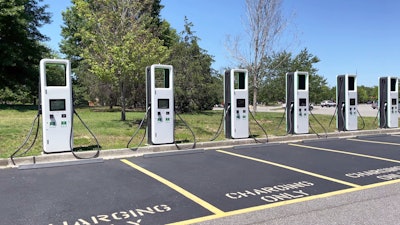
A White House memo that froze federal funds for building electric vehicle charging infrastructure earlier this year overstepped its legal authority, according to a new report from the U.S. Government Accountability Office.
In its report issued May 22, the GAO stated the U.S. Department of Transportation’s deferral of these funds, issued under the Biden-era National Electric Vehicle Infrastructure Formula Program, violated a provision of the Impoundment Control Act of 1974, a federal law that regulates the president’s ability to withhold funds approved by Congress.
The GAO, which serves as a bipartisan investigative arm of Congress, gave the following rationale in its report:
“Under the ICA, a section referred to as the fourth disclaimer prohibits withholding from obligation or expenditure funds appropriated for programs where there is a mandate to spend therefor. We conclude that the NEVI Formula Program is covered by the fourth disclaimer. Therefore, DOT is not authorized to withhold these funds from expenditure and DOT must continue to carry out the statutory requirements of the program.”
The GAO did point out USDOT can find other ways to rescind the funds, though they must be approved by Congress. The GAO does not have the legal ability to enforce its findings, and the USDOT is not required to immediately unfreeze the NEVI funds.
The full report’s findings can be read here.
EV Policies in Crosshairs from Day One
Rescinding policies and programs that support EVs was an immediate goal for President Donald Trump’s administration.
The “Unleashing American Energy” executive order, signed by Trump January 20 under the premise of “terminating the green new deal," paused the disbursement of some funds from the Inflation Reduction Act of 2022 and $2 trillion Infrastructure Investment and Jobs Act. The order specifically stated that it applied to “including but not limited to funds for electric vehicle charging stations made available through the National Electric Vehicle Infrastructure Formula Program and the Charging and Fueling Infrastructure Discretionary Grant Program.”
The Federal Highway Administration issued a memo on February 6 canceling all previously issued guidance under the NEVI Formula Program and suspending all state plans submitted under the program.
Additionally, Transportation Secretary Sean Duffy’s first action in his new office directed the National Highway Traffic Safety Administration to review Corporate Average Fuel Economy standards, which govern the average fuel efficiency car manufacturers must achieve across their entire sold fleet in the U.S.
In the memo, Duffy said the Biden administration had used CAFE standards to force rapid electrification of U.S. vehicles.
In that same memo, Duffy spelled out how President Donald Trump’s “Unleashing American Energy” executive order had directed the USDOT to do the following:
- Remove regulatory barriers to motor vehicle access
- Ensure a level regulatory playing field for consumer choice in vehicles
- Terminating, where appropriate, state emissions waivers that function to limit sales of gasoline-powered automobiles
- Consider the elimination of unfair subsidies and other ill-conceived government-imposed market distortions that favor EVs over other technologies and effectively mandate their purchase by individuals, private businesses and government entities alike by rendering other types of vehicles unaffordable
Earlier this month, 16 states and the District of Columbia sued the Department of Transportation over the freezing of NEVI funds. Duffy said in a statement the lawsuit was attempting to “block the U.S. Department of Transportation’s lawful update” to the NEVI program, adding the NEVI program’s “convoluted structure has made it nearly impossible to utilize.”
Since the NEVI program was enacted over three years ago, 84% of its funds remain unobligated, according to USDOT.












